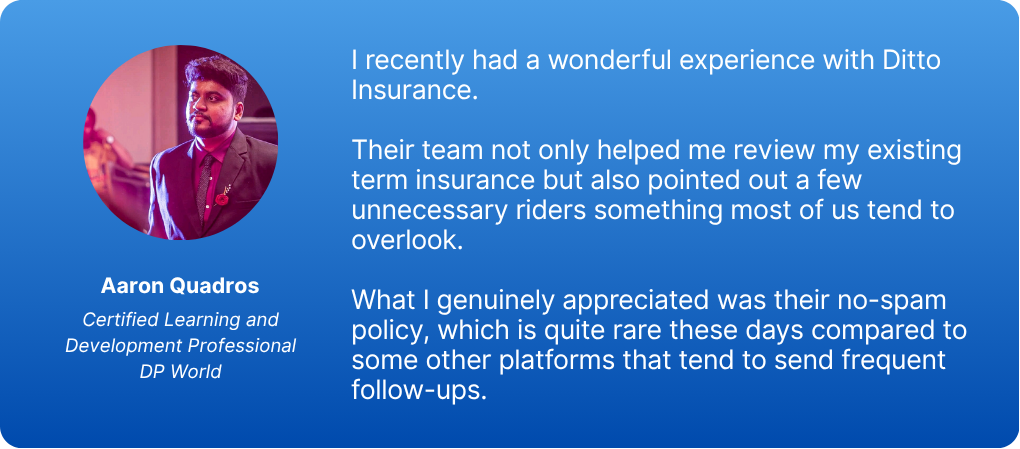I have written several articles about LIC this past week, and I’ve been getting many queries about it.
(P.S. Here’s a quick look at our queue of LIC articles and what our in-house experts say about the brand!)
One of the most common questions I get is, ‘Which is better insurance: LIC or term insurance?’ So, in this article, I’ve decided to clarify things, explain the differences, and tell you which one is better, depending on your needs.
Friendly reminder: It’s easy to get lost comparing policies and premiums. Instead of spending hours on it, why not get personalized insurance advice from Ditto? We offer free consultations with zero spam! Just book a call to clarify all your doubts.
Overview: Clearing the Confusion Between LIC or Term Insurance
What is LIC (Life Insurance Corporation of India)?
LIC is a public sector life insurance company owned by the Government of India. Established in 1956, it has become synonymous with life insurance in the country. Over the decades, LIC has built a reputation for trust and reliability. It offers a wide array of insurance products, including traditional savings-cum-protection plans like endowment policies, money-back policies, whole life plans, ULIPs, pension plans, and yes, even term insurance. Its vast network of physical agents and branches, especially in semi-urban and rural areas, adds to its reach.
LIC offers a broad spectrum of life insurance products, including many traditional policies. These include:
- Endowment Plans: Combine life cover with a savings or investment component.
- Money-Back Plans: Provide periodic returns during the policy term.
- Whole Life Plans: Offer lifetime coverage with a maturity benefit.
- Unit-Linked Insurance Plans (ULIPs): Combine market-linked investment with life insurance.
- Pension/Annuity Plans: Designed for retirement income.
What Is Term Insurance?
Term insurance is a pure protection plan that provides financial security to your loved ones in case of your untimely demise. You pay a premium for a specific term (say, 30 years), and if something happens to you during that period, your nominee receives the sum assured. There are no maturity or survival benefits — unless you opt for a return of premium variant, which is more expensive and, honestly, not needed.
Term insurance is the most efficient and affordable way to get high life coverage. This is why LIC has also recently started offering term insurance.
Top Term Insurance Plans from LIC (Life Insurance Corporation of India)
The Life Insurance Corporation of India has two term insurance plans. Here, we have summarized them into a neat table:
Best Term Insurance Plans in India from Other Top Term Insurance Providers
Here are the top term insurance plans that we usually recommend at Ditto:
LIC vs. Top Term Insurers in India
Now that you’ve seen the policies themselves, let’s take a closer look at how the insurers fare against the industry averages:
As you can see, LIC has the highest business volume. So much so that it’s over 4 times more than the remaining three put together. So, naturally, they also paid the highest amount in claims (in terms of absolute numbers). However, LIC has a slightly lower CSR & ASR, and a significantly higher complaint volume. This, coupled with subpar digital initiatives, is why we do not recommend LIC to our customers.
Still, a lot of people say that LIC enjoys sovereign backing due to government ownership. However, it is important to clarify that no life insurance company, including LIC, offers explicit sovereign guarantees. All insurers are regulated strictly by the Insurance Regulatory and Development Authority of India (IRDAI). The IRDAI mandates a minimum solvency ratio of 150% to ensure financial soundness. Most insurers comfortably maintain a solvency ratio between 180% and 220%. In the unlikely event of an insurer facing trouble, the IRDAI intervenes to protect policyholders' interests, often by merging distressed insurers with healthier companies.
Why Talk to Ditto for Your Term Insurance?
At Ditto, we’ve assisted over 8,00,000 customers with choosing the right insurance policy. Why customers like Aaron below love us:

- No-Spam & No Salesmen
- Rated 4.9/5 on Google Reviews by 15,000+ happy customers
- Backed by Zerodha
- 100% Free Consultation
You can book a FREE consultation. Slots are running out, so make sure you book a call now!
Conclusion
There you have it, folks. LIC is not a type of insurance — it’s an insurance company. LIC also offers term insurance, just like other insurers. The real decision is whether to opt for LIC’s traditional policies, LIC's term plans, or a term plan from a private insurer. If you’re looking for the most cost-effective way to secure your family’s future, term insurance is the way to go. It’s ideal for young professionals, parents with children, or anyone with financial dependents.
The premium is lower, and the coverage is high. This makes term insurance the best tool to protect your family from income loss in case of death. You can then invest the remaining money (which you would’ve otherwise spent on an endowment policy) in mutual funds or other investment vehicles to generate a return.
Last updated on:










